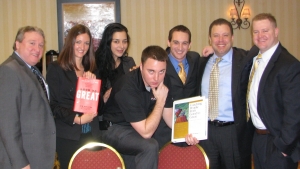 … in a very special way – without judgement and with care and concern for their well-being.
… in a very special way – without judgement and with care and concern for their well-being.
We have many cultural changes affecting today’s sales forces. Religion and a commitment to a set of standards and moral values has decreased (see Barna statistics). This contributes to a loss in customer service values, honesty, hard work ethic, and personal responsibility (see U.S. debt levels). Even our sports heroes (Tiger Woods) or political figures suffer embarrassing failures in front of their admirers. When I am quizzing young salespeople and sales leaders in their 20’s, I see no goals, low commitment, and an entitlement mindset unlike the values and beliefs of two generations before. However, they know something “ain’t quite right.”
Michael Kimmel, in his research and book Guyland, has identified a new social stratum which affects 22 million young men ages 16-26. Men mature later today. Many live together in a state of suspended boyhood out of college – yet still acting as if they still remain there. For many, they job hop, live with their parents into their late 20’s, stay single, drink an extended number of nights each week, and dive into sports, online games, or fantasy. Fewer boys grow up with mentors or dads. All of this has profound meaning for sales managers and leaders. It affects an attachment to responsibility and reduces achievement drive levels. It impacts sales.
As you think of these new societal shapings, consider once more what salespeople say about why it’s hard to change to more effective ways of doing things.
Change itself … Some people just do not want to put in the extra effort. They just say no to new ideas.
Comfort level … It’s uncomfortable doing new things. It may hurt for awhile – not feel good.
Creation of new habits .. It’s one thing to change. It’s another to turn it into a new routine.
Mindset … Our minds have lots of neurons attached to old ways. it’s tough to re-channel them.
Fear … The new scares people. We might not look good, or do it well, or we might fail.
Execution of doing the new ideas … It might require self-discipline, a new and continuing focus, or hard work.
Knowing what’s effective … A salesperson doesn’t know what will work better than what’s being done now.
Admitting you’re deficient even wrong … We have personal ownership in old skills. Pride keeps us from changing.
Motivation level … Salespeople do not want the end result bad enough to go through 1-8.
We can impact these 9 roadblocks to performance and change by first paying attention to character traits during recruitment. We look for appropriate levels of honesty, hard work ethic, and personal responsibility. In our interviews, we also work to find emotional commitments tied to specific incomes. In other words, do they have to make a certain amount of money for a very important reason? Are their income needs, when translated into sales targets, above minimum standards for sales performance?
Then, we get to know our reps. We coach AND mentor them. We learn to ask questions like, “What do you want?” Or, “What’s the three most important things in your life right now?” When asking these, we follow up their answers with questions like, “Why is that important to you?” “To improve your lifestyle, how much money will you need to earn this year above your survival needs?”
Our interest in their needs and what they want from us will flame their desire and commitment to changes for improved sales performance. For today’s reps, we will have to earn their trust and commitment. We will have to be the authority figures they can count on – ones that coach with care and concern for their well-being. We can do this. Let’s do it. Lance.
